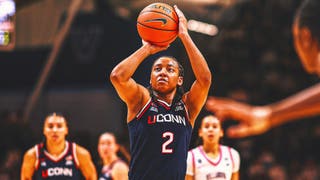
HOUSTON - JUNE 22: Clint Dempsey #8 of the U.S.A. celebrates with Landon Donovan #10, Michael Bradley #4 and Alejandro Bedoya #22 after scoring in the second half against Panama at Reliant Stadium on June 22, 2011 in Houston, Texas. U.S.A. won 1-0. (Photo by Bob Levey/Getty Images) (2011 Getty Images)
If this isn’t a golden generation of U.S. soccer, it will do until the actual golden generation gets here.
Players like Landon Donovan, Clint Dempsey, Tim Howard and Michael Bradley have to be considered among the best 11 this country has ever produced, and the young winger Julian Green may yet join their number.
Even Jürgen Klinsmann, who doesn’t always seem like the most tactically adept coach, is still probably the best personnel manager the U.S. Men’s National team has ever seen.
So, does that mean that the U.S. has a realistic shot at winning the World Cup?
Well, no. Not really. Most of that golden generation is on the wrong side of 30 to carry them to the trophy.
But don’t be too surprised if the Yanks manage to survive the Group of Death and make it all the way to the semifinals.
Players to Watch
Landon Donovan: At 32, the greatest player to ever wear the American uniform is definitely on the downside of his career arc, but he can still change a game with a key run or a flick of the foot. He’s had a hard time bonding with Klinsmann, and it isn’t clear whether he’ll start or come off the bench during the Cup.
Clint Dempsey: Dempsey isn’t far behind Donovan in both age (31) and goal scoring (.350 per game while scoring average with the national team compared to.365 for Donovan), but it feels like Dempsey is closer to the top of his game. Klinsman certainly seems to believe so, having given the forward the captain’s armband in March of 2013.
Michael Bradley: Once upon a time, Bradley seemed like the nepotistic choice of an optimistic father (Michael’s dad, Bob, was national team coach before Klinsmann). But the 26-year-old is all grown up and a proven talent who helped turn A.S. Roma into a contender last year. Now back in the MLS with Toronto F.C., Bradley seems destined to surpass Claudio Reyna as the best midfielder the U.S. has ever produced.
Tim Howard: Like Dempsey and Donovan, Howard, 35, is probably taking part in his last Cup, but age tends to be less of a factor for goalies than for other players. Can he be an effective last line of defense against some of the best scorers in the history of the game, including Portugal’s Cristiano Ronaldo and Germany’s Miroslav Klose? Whether or not the U.S. advances to the knockout round may depend on the answer to that question.
Julian Green: There are many people who believe that Klinsmann was only able to convince the Bayern winger—who was born in Tampa but moved to Germany when he was only 2 and played on that country’s national youth squads—to play for the U.S. by promising him a spot on the 2014 Cup roster. So far, so conspiracy theory borne out. If Klinsmann does name Green, who turns 19 on June 6, to the 23-man roster, why not try out the future of the American team as a late-game replacement? Maybe even against (wait for it) ... Germany?
Coach
Jürgen Klinsmann: One of the all-time great players, who scored three goals in West Germany’s 1990 Cup victory, and 8 more Cup goals after unification, Klinsmann clearly knows what it takes to win. As a coach, he is prone to radical shifts in strategy and personnel maneuvers that don’t always pay off. After a rocky start to his U.S. men’s national team coaching tenure in 2011—the team went 1-4-1 in his first 6 games as coach—he has secured his position by qualifying easily for Brazil and in recruiting Green to the U.S. side.
Group
The soccer gods were not smiling on the U.S. when it got drafted into Group G—a.k.a., the “Group of Death”—to play against a formidable set of teams. Germany is a perennial contender for the championship, and its passage to the knockout round has to be assumed. Which leaves only one open slot for the U.S., Portugal or Ghana. Despite the presence of the world’s best player in Ronaldo, the Portuguese may be the weakest link. Ghana returns many of the same key personnel from the 2010 team that eliminated the U.S. in the Round of 16, including Michael Essien, Kevin Prince Boateng and Asamoah Gyan.
Quirk
Of all the teams at the Cup, the U.S. has the worst travel schedule in terms of longest itineraries. Training in Sao Paulo, the Yanks have to travel more than 1,225 miles to each of their group stage games in Natal, Manaus and Recife.
Schedule
v. Ghana, Mon. June 16, 6 p.m., Natal
v. Portugal, Sun., June 22, 6 p.m., Manaus
v. Germany, Thu., June 26, 12 p.m., Recife
All times Eastern








































